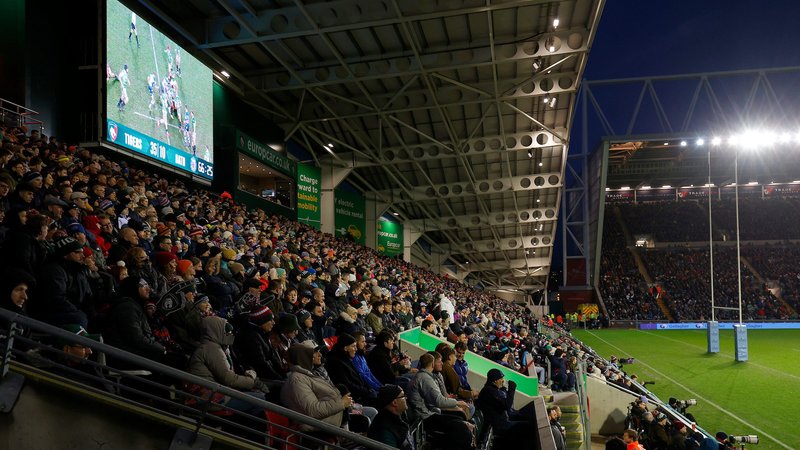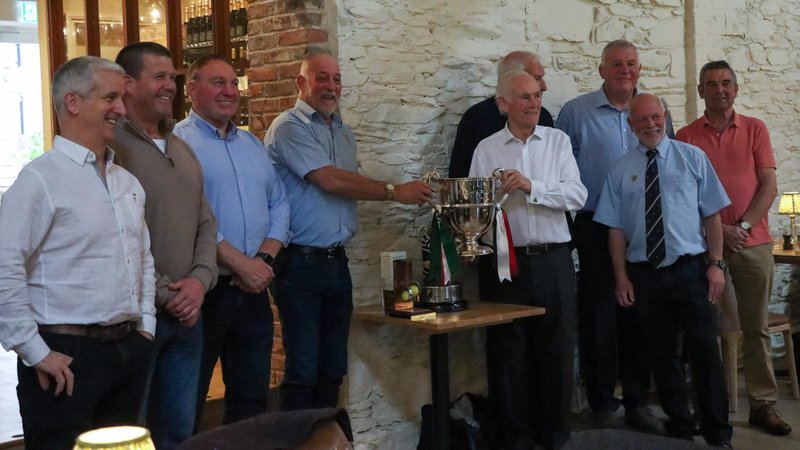However, while they might have lost out on the pitch, Saints fans came out on top in a passion test on the day.
League sponsor Aviva has partnered with the University of Bath to scientifically investigate which Aviva Premiership Rugby club has the most passionate fans. The result means that Northampton fans are currently lying second in the Aviva Premiership Passion League Table just behind Gloucester.
The season-long project continued at Welford Road, where the research team undertook a variety of experiments on a sample set of 26 fans (13 from each club) who applied to take part. Their anxiety and testosterone levels were measured, as well as their heart rate throughout the match.
The university have devised an equation for passion, which is calculated from the interaction of four variables:
1) fan loyalty (commitment to the team)
2) fan match evaluation (before and after the match)
3) fan psychology (mood and anxiety levels)
4) fan physiology (hormone and heart rate changes)
The results are weighted alongside an independent review of the match by a former England player, to allow all 6 ‘crunch’ matches, and 12 sets of supporters, to be compared.
Here is a summary of the fans’ results from the East Midlands derby:
• Heart rate (HR): was measured before the match and compared to heart rate during the match. Changes in heart rate were indicators of high levels of passion. The average HRs (both teams, all time periods) ranged from 90-100, the upper end of the normal range.
Northampton’s second half comeback followed by Leicester’s winning try in the final minutes through Horacio Agulla resulted in a significant surge in heart rate for Northampton fans. Their initial excitement and then huge disappointment were reflected by their heart rate equalling that of a person taking part in an anaerobic training session.
• Commitment: Both sets of fans rated themselves as equally ‘psychologically committed’ but the Northampton fans committed more time to following their team than Leicester fans and came out with a much bigger ‘Fan Loyalty’ score (50/36).
• Predictions: Unsurprisingly, both fans thought their team would win: Leicester fans by 4 points (20:16 on average), Northampton fans by 7 points (22:15 on average). ). Both sets of fans underestimated both their team’s score and the opposition’s score. Tigers fans predicted the outcome correctly and by about the right margin - although they predicted lower scores than were achieved.
• Stress: Leicester fans had a huge surge in cortisol during the game (the higher the cortisol, the higher the stress), suggesting that although they won, they found the match incredibly stressful. Northampton fans did not vary in their levels of cortisol throughout the game.
• Testosterone (T): T levels were measured before the match, at half time and at the final whistle. There were no changes in the levels of T between before the match and the half time whistle. At the final whistle, however, both sets of fans had had a huge surge in T – Tigers fans had a 21% increase in T, Saints fans had a 16% increase in T. This highlights that the fans psychological emotional response was being matched by their biological response.
• Mood-swings: Mood can be defined in many ways, but it can be considered that positive and negative moods are two general categories. Winning dramatically reduced the negative mood in Leicester fans and increased positive mood. However, losing dramatically reduced positive mood in Northampton fans, and increased negative mood. As might be expected, the winners went home happy and the losers went home sad.
• Anxiety: The same pattern was observed when looking at anxiety. After the match, the Tigers fans were much less anxious and tense (remember they had perceived a bigger threat before the match). Saints fans were not more anxious and tense, but there mood was certainly more negative.
• Post-match analysis: After the match, both sets of fans thought their teams and the opposition had played at about the same level that they usually do and that the outcome was not down to Saints playing badly. Tigers fans attributed the win to their team playing well while Saints fans were left blaming the ref after they attributed the outcome to a number of poor refereeing decisions.
The result: Northampton fans were more passionate than Leicester fans by a passion score of 156-148.
The figures from each test section were combined in to a passion equation and then scaled so all 4 categories can have a possible maximum of 100.
Leicester Northampton
Fan Loyalty 36 50
Fan Evaluation 30 16
Fan Psychology 55 49
Fan Physiology 27 41
Fan Passion 148 156
A researcher from the University of Bath said: “The ‘most passionate fans’ project represents an interesting opportunity to examine fan's passion scientifically. There will always be arguments about how this can be done, but we believe we have devised the most objective way to identify and quantify passion. While the Saints fans may feel aggrieved at the outcome on the pitch, hopefully their performance off the pitch will give them something to shout about for the return leg!”
Louisa Cheetham, Senior Sponsorship Manager at Aviva, said: “Our most passionate fans project shows that rugby truly is a fans game. Aviva want to get fans as close to the action as possible, and this experiment does just that. The Leicester-Northampton match was arguably the dream game for this study as it really did have everything – even neutrals were on the edge of their seats! It must have been heart-breaking for those Saints fans to lose a game in that fashion so I hope these results will make them feel slightly better about the defeat. It’s interesting to see that the Gloucester fans are still top of the Passion League Table so it’s up to the remaining eight sets of fans to challenge them for the title of ‘Most Passionate Fans’!”
Aviva and the scientists continue the project in February when current Aviva Premiership leaders Harlequins face London Irish on the 11th February, followed by last year’s champions Saracens game against Wasps on 12th February. Fans from all four teams are now being called on to apply to take part, by emailing [email protected] with their name, age, address, club, and a sentence or two explaining why they think they are a passionate fan.







